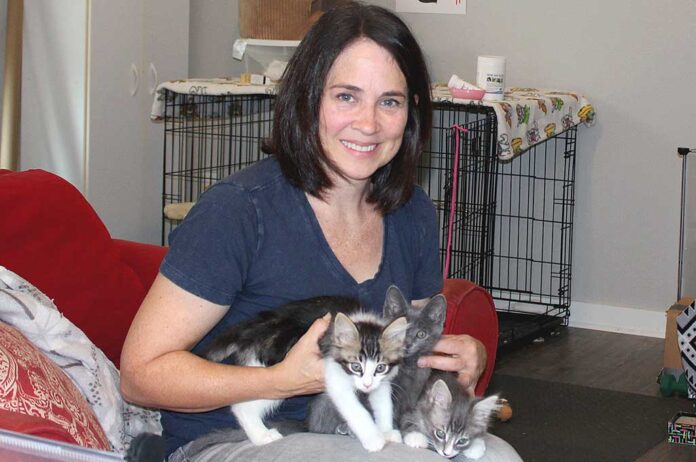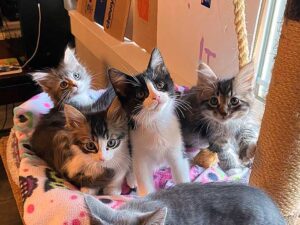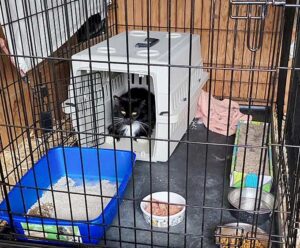
Eight cats and kittens are living in safe, healthy, loving homes today thanks to a woman who alerted Tualatin resident Jennifer Bosket that about 16 to 18 felines were living around a manufactured home that was subsequently demolished in a residential park at the intersection of Tualatin and Herman roads.

Bosket, who has been a cat foster mom since 2017, learned that someone at the park was feeding the cats, but Bosket knew only too well that the cats were probably not all sterilized and thus multiplying.
“I was given permission to start helping one of the residents with the cat situation after all the (manufactured-home) clean-up was complete,” Bosket said. The cats were trapped, and Bosket fostered a semi-feral mom with five 4-week-old kittens, until the kittens were weaned and put up for adoption, and the mom went to a barn home. According to Bosket, if a cat has no contact with humans for its first 12 weeks, it is very difficult to socialize after that initial time period.
“Two senior cats that were fairly friendly, who we found out were already fixed and chipped, were pulled into rescue at CAT (Cat Adoption Team),” said Bosket while juggling a couple of kittens on her lap. “After the required stray hold through the county and with no owner coming forward after attempted contacts and some time in foster care, they were both adopted to finish their golden years safely indoors in a quiet home.”
Seven under-socialized cats were trapped/fixed and moved to barn homes or homes with future outdoor access. This required a minimal four-week acclimation period before they were released to explore their new spaces.
Bosket, who named the kittens after different kinds of crackers, said that fostering the group “is a full-time job.”

A humane approach to dealing with feral cats is “TNR” or Trap/Neuter/Return (back to the location where they were found), and Bosket explained, “Four cats were TNR’d and are being fed at the park (with donations), but we are looking for barn or outdoor homes for them. TNR is more effective than ‘catch and kill’ because it stabilizes the population and doesn’t allow the ‘vacuum effect’ to come into play. The vacuum effect is when you remove cats from a site and others move in.”
She appreciates that the residents of the manufactured-home park were willing to ask for help and that the person who was feeding them helped her trap them.
But there was one casualty in the process, according to Bosket.
“One extremely weak, ill, and badly injured adult cat with a broken and infected leg was taken to a local vet, who determined it would be almost impossible to perform a surgery in its current health, which would require amputation of the leg,” she said. “The cat would’ve required at least six weeks to even be healthy enough for surgery, and then beyond that, the cost would have become astronomically high, all for a cat whose socialization status we didn’t know. So, we did all agree to do the compassionate thing and ended the kitty’s suffering through euthanasia.”
She added, “Overall this story had a good ending, but instead of finding homes for kittens, it is better not to have them to start with. Half of those cats weren’t fixed, and half were female. Cats usually have two litters a year, but they can have three.
“If people see cats wandering around, and they don’t have a collar, people can take them to a vet to be scanned for a microchip. If they don’t have a chip or a collar, you can legally take them in.”
She added, “If you see outdoor stray cats, do not wait to take action to get them fixed. This specific problem, and many others around town, could have easily been avoided if action had been taken long ago to get the first cats fixed. We are very fortunate in the Portland area to have Feral Cat Coalition of Oregon, where anyone can bring a stray/feral cat for spay/neuter and vaccination for a suggested fee of $40, or it’s free if you cannot afford the fee. There’s just no excuse for situations like this.
“This is a community problem, and it requires a community effort. Don’t turn a blind eye. If it wasn’t for one person initially taking the action of going, seeing, and choosing to do something, who knows how many kittens would’ve been born there this year? Please, don’t just see a problem and walk away. Take action.”
Have a Feral Cat on Your Property?
The Feral Cat Coalition of Oregon can help you if you have feral cats on your property or become aware of a situation that needs intervention.
The office is located at 4522 S. Water Ave., Portland; the phone number is 503-797-2606; the website is www.feralcats.com; and the email address is info@feralcats.com.
















